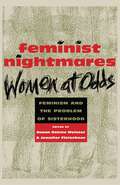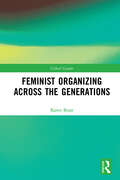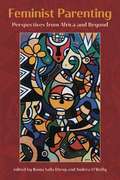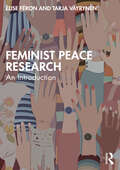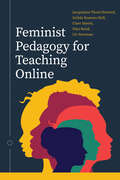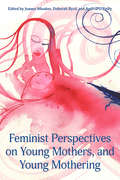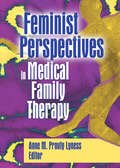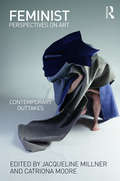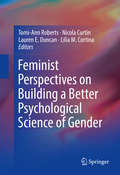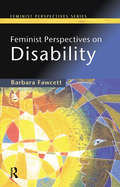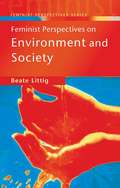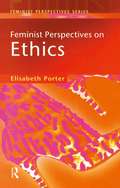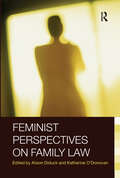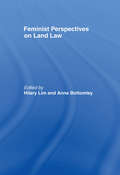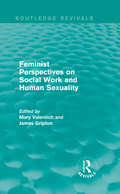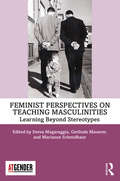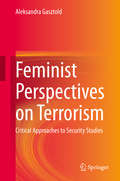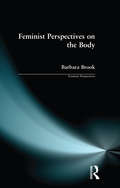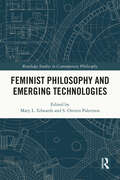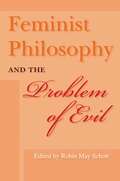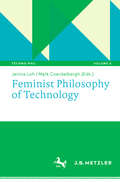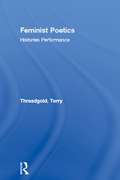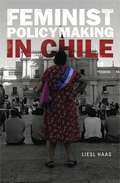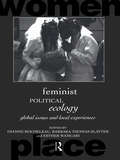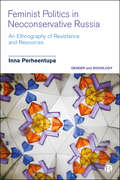- Table View
- List View
Feminist Nightmares: Feminism and the Problems of Sisterhood
by Susan Ostrov WeisserThough all women are women, no woman is only a woman, wrote Elizabeth Spelman in The Inessential Woman. Gone are the days when feminism translated simply into the advocacy of equality for women. Women's interests are not always aligned; race, class, and sexuality complicate the equation. In recent years, feminist ideologies have become increasingly diverse. Today, one feminist's most ardent political opponent may well be another feminist. As feminism grows increasingly diverse, the time has come to ask a painful and frequently avoided question: what does it mean for women to oppress women? This pathbreaking, provocative anthology addresses this troublesome dilemma from various feminist perspectives, offering an interdisciplinary collection of writings that widens our understanding of oppression to take into account women who are at odds. The book examines the social, political, and psychological ramifications of this phenomenon, as evidenced in a range of texts, from women's antislavery writing to women's anti-abortion writing, from mother-daughter incest stories to maternal surrogacy narratives, from the Bible to the popular romance nove, from Jane Austen to Alice Walker. The value of the volume is perhaps best summed up by an early response to the idea-This is a book that should never be written; feminists should concentrate on how men oppress women. Ironically, it is precisely because the subject triggers such responses, the authors argue, that a volume such as Feminist Nightmares has become a necessity.
Feminist Organizing Across the Generations (Global Gender)
by Karen BojarFeminist Organizing Across the Generations spans almost 60 years of feminist history and traces the evolution of feminist activism from the 1960s until the present. Using the Philadelphia chapter of the National Women's Organization as a starting point, Karen Bojar explores how feminist organizing was unfolding in similar ways across the county. The book examines the enormous energy put into building feminist service organizations such as women's shelters and rape crisis centers which were to have a profound impact on major social institutions, health care delivery and the justice system. The book also looks at the differences between the organizing strategies of "second wave" feminists and those of the 21st century. Much 21st-century feminist organizing is taking place outside of explicitly feminist groups, with young feminists bringing a gender justice perspective to a range of racial, economic and climate justice organizations. This book is suitable for students and scholars in women's and gender history, political history and gender studies.
Feminist Parenting: Perspectives from Africa and Beyond
by Rama Salla Dieng Andrea O’ReillyFeminist Parenting: Perspectives from Africa and Beyond asks and considers: What is feminist parenting? Is it something for all parents? What does it mean to be a feminist parent in practice? The collection aims to fill a gap on feminist parenting in the existing literature by bringing timely post-Western perspectives. More specifically, the anthology's main contribution is its explicit focus on feminist parenting from the margins to the global periphery: from Africa and its diaspora, from the Global South to Europe and America. The 27 parents from diverse backgrounds, walks of life, and countries gathered in this anthology share powerful responses to the above questions by narrating their experiences of some of the challenges, dilemmas, promises, and compromises of parenting with a feminist perspective. The volume is one of the first collections published with first-person essays describing very touching, beautiful, and sometimes painful stories of what it means and more importantly what it costs to become a feminist parent with an intersectional approach. In doing so, the authors of this book aim at (re)claiming parenting as a necessarily political terrain for subversion, radical transformation, and resistance to patriarchal oppression and sexism.
Feminist Peace Research: An Introduction
by Tarja Väyrynen Élise FéronThis textbook provides a comprehensive overview of the field of gender, feminism and peace.It is based on the argument that feminist thinking is necessary to understand and analyse the core issues in peace and conflict studies and is fundamental to thinking about solutions to global problems and to promoting peaceful conflict transformation. The book centres alternative and critical approaches missing in mainstream peace research and brings forward feminist perspectives on traditional peace research topics such as militarism, peacekeeping, arms trade and the articulation of different forms of violence. It also advances critical and alternative issues and topics that traditional peace research has sidelined, including, for example, artificial intelligence, technologies and peace; trauma and memory; human–non-human species relations; art; popular culture; post-colonial and decolonial feminist perspectives; and the queering of war and peace. In sum, this textbook contributes to the visibility of these feminist critical approaches to peace research and makes them accessible to scholars and students interested in the subject.This book will be of much interest to students of peace studies, feminist theory, gender studies and International Relations.
Feminist Pedagogy for Teaching Online
by Enilda Romero-Hall Jacquelyne Thoni Howard Clare Daniel Niya Bond Liv NewmanInstructors across higher education require inspiring and practical resources for creating, adapting to, and enhancing, online teaching and learning spaces. Faculty need to build collaborative, equitable and trusting online learning communities. This edited volume examines the experiences that interdisciplinary and global feminist educators have had—both their successes and their challenges—in infusing feminist pedagogical tenets into their online teaching and learning practices. Contributors consider how to promote connection, reflexivity, and embodiment; build equity, cooperation, and co-education; and create cultures of care in the online classroom. They also interrogate knowledge production, social inequality, and power. By (re)imagining feminist pedagogy as a much-needed tool and providing practical advice for using digital technology to enact these tenets in the classroom, this collection will empower educators and learners alike.
Feminist Perspectives on Young Mothers and Young Mothering
by Joanne MinakerTo be a young mother is almost by definition to be considered an “unfit” mother. Thus, it is not surprising that young Canadian, U.S. and Australian mothers are often scorned, stigmatized and monitored. This is a book about being young, being a mother, and grappling with what it means to inhabit these two complex social positions. This book critiques the dominant, negative construction of young motherhood. Contributors reject the notion that the “ideal” mother is a 30ish, white, middle-class, able-bodied, married, heterosexual woman situated in a nuclear family. This collection privileges the insights and stories of a diverse array of young mothers such as; a young mother coerced into giving her child up for a adoption, a young queer mother who has been parenting a child borne by her trans partner and who is now pregnant herself and many more. The tales analyzed and recounted in the collection record experiences of pain and joy, frustration and success, struggle and resistance, oppression and empowerment. We invite readers to hear the all too often silenced stories of young mothers, to learn what prevents and what allows these mothers to lead lives of grit, determination, authenticity, and agency as they strive to lovingly care for themselves, their children, and in many cases, other young mothers.
Feminist Perspectives in Medical Family Therapy
by Anne M. Prouty LynessReinforce the relationship between healthy bodies and healthy relationships in families! Feminist Perspectives in Medical Family Therapy explores the groundbreaking collaboration of therapy and medicine to form a biopsychosocial approach to health care. In this book, feminists from several fields of study offer their ideas, research, and personal experiences to show how gender, culture, and other diversity issues affect medical treatment. This invaluable tool provides tips and suggestions for interdisciplinary medical teams working with patients&’ bodies, minds, spirits, and relationships simultaneously. Medical family therapy is a relatively new specialty, and this book demonstrates its advantages and opportunities with an easy-to-understand, applicable approach. Clinicians, researchers, trainers, and students in medicine, social work, family therapy, psychology, and others can use Feminist Perspectives in Medical Family Therapy to examine more closely the medical issues that are most relevant to women and families. In this unique resource, you&’ll learn about: how both biological factors and environment create gender differences-and how they apply to women with depression how the issues of power and gender influence the experiences of male and female medical family therapists incorporating feminist principles in family medicine education the benefits of collaborative care to both physicians and patients in a family medicine setting using couples therapy in cases of vulvar vestibulitis syndrome how a woman&’s diagnosis of cancer affects the family system Feminist Perspectives in Medical Family Therapy offers a variety of viewpoints from patients and providers, using hard data, interviews, practicum models, case examples, and reflections on personal experiences.
Feminist Perspectives on Art: Contemporary Outtakes
by Jacqueline Millner Catriona MooreWhen the body is foregrounded in artwork – as in much contemporary performance, sculptural installation and video work – so is gendered and sexualised difference. Feminist Perspectives on Art: Contemporary Outtakes looks to interactions between art history, theory, curation, and studio-based practices to theorise the phenomenological import of this embodied gender difference in contemporary art. The essays in this collection are rooted in a wide variety of disciplines, including art-making, curating, and art history and criticism, with many of the authors combining roles of curator, artist and writer. This interdisciplinary approach enables the book to bridge the theory–practice divide and highlight new perspectives emerging from creative arts research. Fresh insights are offered on feminist aesthetics, women’s embodied experience, curatorial and art historical method, art world equity, and intersectional concerns. It engages with epistemological assertions of ‘how the body feels’, how the land has creative agency in Indigenous art, and how the use of emotional or affective registers may form one’s curatorial method. This anthology represents a significant contribution to a broader resurgence of feminist thought, methodology, and action in contemporary art, particularly in creative practice research. It will be of particular value to students and researchers in art history, visual culture, cultural studies, and gender studies, in addition to museum and gallery professionals specialising in contemporary art.
Feminist Perspectives on Building a Better Psychological Science of Gender
by Tomi-Ann Roberts Nicola Curtin Lauren E. Duncan Lilia M. CortinaThis timely and thought-provoking collection explores the ways in which psychological science interacts with and addresses gender across varied subdisciplines in the field, from a feminist viewpoint. A particular aim of this volume is to move the conversation of gender in psychology beyond a difference-only paradigm. Veteran and emerging feminist scholars survey the handling of sex and gender issues across psychology, and describe how feminist perspectives and methodologies can and should be applied to enhance the field itself, but also in the service of social justice in the various cultures of corporations, academia, and the global stage. Contributions span theoretical advances, latest empirical findings, and real-world advocacy, with instructive and illuminating first-person accounts detailing challenges and rewards of feminist scholarship and practice in psychology. Throughout the volume, chapters document a dynamic field in its evolution from the traditional, two-dimensional study of gender-based differences to concerted multidisciplinary approaches, to cutting edge feminist theoretical and methodological advances such as intersectionality to understand gender in context. The volume is divided into three distinct sections. The first covers current theory and research in psychological science that considers gender beyond a difference-only paradigm. Then, leading feminist scholars reflect upon their own experiences in their respective subdisciplines. Finally, the third section explores innovative best practices and applications for feminist psychological science. Highlights of the coverage: * Beyond difference: Gender as a quality of social settings. * Adventures in feminist health psychology: Teaching about and conducting feminist psychological science. * Mind the thigh gap? Bringing feminist psychological science to the masses. * Feminist psychologists and institutional change in universities. With its stimulating compilation of theories, research, and applications, Feminist Perspectives On Building A Better Psychological Science of Gender is one of the most forward-thinking and innovative treatments of the field in recent years. It is a significant and important text for all psychologists, women's and gender studies specialists, social science researchers, and all those interested in using evidence-based psychological science to create a more just and equitable world.
Feminist Perspectives on Disability (Feminist Perspectives)
by Barbara FawcettFeminist Perspectives on Disability provides a unique introduction to the key debates in relation to both feminism and disability. The author considers contemporary similarities, differences and contentious areas and how concepts drawn from postmodern feminism can be usefully applied to the disability arena. The book explores many important aspects of the field, including: biological debates; issues of power, knowledge, equality, difference, subjectivity and the body; interface of public and private/care and community; medical and social barriers; politics, citizenship and identity.Feminist Perspectives on Disability will be compulsory reading for students of all levels in Women's Studies, Gender Relations, Social Policy, Social Work/Social Care and social Science.
Feminist Perspectives on Environment and Society (Feminist Perspectives)
by Beate LittigFor courses in Environmental studies, Environmental Sociology, Environmental geography and Development studies; Women's studies and Women's issues options on a wide variety of degree courses. Combining theory with practice, this concise, accessible text provides a comprehensive introduction to the concepts, theories and results of environmental sociology from a feminist perspective. Within an international context it portrays in full the different feminist perspectives on environment and society, which are marginalized in mainstream research, and shows how the feminist critique on environmental sociology contributes to a more general feminist critique of society. Part of the Feminist Perspectives Series providing stimulating introductions to key feminist topics and debates written by well-known, experienced teachers in each field.
Feminist Perspectives on Ethics (Feminist Perspectives)
by Elizabeth PorterFeminist Perspectives on Ethics is a unique guide to the development of feminist thought on ethics and moral agency. Each chapter offers a survey of feminist debates on key areas: the nature of feminist ethics; intimate relationships; professional ethics; politics; sexual politics; abortion and reproductive choices. Importantly, the author draws on the range of ideological viewpoints that exist to demonstrate the rich diversity of feminism and also attempts to break down dualistic, discordant or simplistic understandings of ethics.
Feminist Perspectives on Family Law (Feminist Perspectives)
by Alison Diduck Katherine O'DonovanExamining specific areas of family law from a feminist perspective, this book assesses the impact that feminism has had upon family law. It is deliberately broad in scope, as it takes the view that family law cannot be defined in a traditional way. In addition to issues of long-standing concern for feminists, it explores issues of current legal and political preoccupation such as civil partnerships, home-sharing, reproductive technologies and new initiatives in regulating family practices through criminal law, including domestic violence and youth justice.
Feminist Perspectives on Land Law (Feminist Perspectives)
by Anne Bottomley Hilary LimThe first book to examine the critical area of land law from a feminist perspective, it provides an original and critical analysis of the gendered intersection between law and land; ranging land use and ownership in England and Wales to Botswana, Papua New Guinea and the Muslim world. The authors draw upon the diverse disciplinary fields of law, anthropology and geography to open up perspectives that go beyond the usually narrow topography and cartography of land law. Addressing an unorthodox variety of sites where questions of women's access and rights to land are raised, this book includes chapters on: shopping malls ancient monuments nature reserves housing estates the family home. An interdisciplinary and enlivening account of feminist perspectives on land law, it is an excellent addition to the bookshelves of students and researchers in legal studies, gender studies, social anthropology and social geography.
Feminist Perspectives on Social Work and Human Sexuality (Journal Of Social Work And Human Sexuality #Vol. 3, Nos. 2-3)
by Mary Valentich James GriptonFirst published in 1985, this ground-breaking volume contributes to a largely neglected area of social work research, theory and practice. The collection of essays by internationally known social work educators and practitioners applies feminist perspectives to a wide range of issues influencing the social work profession and social work practice. In doing so, it demonstrates that a liberal feminist position is consistent with social work practice. Nearly all the chapters focus on direct practice issues, such as problems faced by women who have been sexually assaulted, the lack of adequate health care provided to lesbians from traditional health care systems, and sexist bias in sex therapy and family therapy models. This book will be of interest to students and practitioners of social work.
Feminist Perspectives on Teaching Masculinities: Learning Beyond Stereotypes (Teaching with Gender)
by Sveva Magaraggia Gerlinde Mauerer Marianne SchmidbaurFeminist Perspectives on Teaching Masculinities looks at teaching non-hegemonic forms of masculinities and highlights their diversity. The collection foregrounds and discusses concepts which are described and gathered as positive, caring, and inclusive masculinities, thus offering a timely and much-needed counterpoint to discussions of so-called toxic masculinity. The volume presents a wide range of theoretical reflections, case studies, and teaching resources for lecturers in higher education and practitioners in the fields of gender studies, pedagogy, and education. Its heterogeneity is based on an interdisciplinary approach, methodological variety, cross-cultural spectrum, and empirical richness, reflected in various contributions from Europe, Africa, US, and Asia. The international scope of the book and its transnational perspective is valuable in broadening perspectives on teaching masculinities. The presentation and discussion of national and local programs and campaigns promoting teaching practices on masculinities and gender provide further valuable insights into learning beyond stereotypes and realizing new concepts of masculinities. By presenting alternative performances of masculinities and fostering masculinities studies which are oriented towards gender equality and/or going beyond gender norms, Feminist Perspectives on Teaching Masculinities offers a strong response to the backlashes against feminism and gender studies from rising nationalism coupled with hegemonic masculinities.
Feminist Perspectives on Terrorism: Critical Approaches to Security Studies
by Aleksandra GasztoldThis book explores terrorism and security issues from feminist perspectives, putting gender and androcentrism at the heart of its analysis. It argues against traditional research approaches to political violence, and terrorism in particular, that are dominated by the “male-gaze” and individual stereotypes and perspectives, and that feminist approaches offer a fresh perspective on security research. Our current understanding of political violence is primarily based on the experiences of men, and as such, the challenge in terrorism and radicalization research is to demonstrate that women’s studies on security and terrorism satisfy certain universal criteria. The author shows how a post-positivist approach can be useful in gaining insights into terrorism and violent extremism, and how to address these phenomena. The book presents theoretical foundations based on various feminist assumptions, and exposes the essence of feminism, its conceptual grid, gender variabilities and the developments in feminist thinking and theory. Furthermore, it discusses the trends in feminist epistemology, and explains female radicalization to terrorist activity, the specificity of female terrorism, and the roles of women in deradicalization processes, as well as their impact on counterterrorism policy. The book concludes that gender difference as a constitutive variable of social reality is of key importance in studies on terrorism and counterterrorism.
Feminist Perspectives on the Body (Feminist Perspectives)
by Barbara BrookFeminist Perspectives on the Body provides an accessible introduction to this extremely popular new area and is aimed at students from a variety of disciplines who are interested in gaining an understanding of the key issues involved. The author explores many important topics including: the Western world's construction of the body as a theoretical, philosophical and political concept; the body and reproduction; medicalisation; cosmetic surgery and eating disorders; the body in performance; the private and the public body; working bodies and new ways of thinking about the body.
Feminist Philosophy and Emerging Technologies (Routledge Studies in Contemporary Philosophy)
by S. Orestis Palermos Mary L. EdwardsThis volume explores urgent questions surrounding the bidirectional relationship between feminist philosophy and emerging technologies. It underlines the exigency of feminist philosophical reflections on the design, use, and understanding of emerging technologies and at the same time accentuates how emerging technologies can uniquely impact the shape of future feminist critique and intervention. While feminist philosophers have attended to problems posed by a few specific technologies that emerged in the previous century—especially reproductive technologies—broader philosophical questions concerning the challenges various new technologies present to feminism have yet to receive the sustained, critical attention they deserve. Feminist Philosophy and Emerging Technologies responds to this problem. It is divided into two sections. Section 1 provides theoretical considerations about the links between feminist philosophy and philosophy of technology (broadly construed) by developing–against the background of emerging technologies–methodological approaches and guidance for bringing those two fields of philosophical research together. Section 2 is dedicated to analyses of specific emerging technologies and user trends, their relation to extant structures of oppression, and to bringing to the fore various ways in which a feminist philosophy of technology can impact the design of current and future technologies. Feminist Philosophy and Emerging Technologies is an excellent resource for scholars and advanced students working in feminist philosophy, philosophy of technology, ethics, political philosophy, feminist theory, gender and cultural studies, and science and technology studies.
Feminist Philosophy and the Problem of Evil
by Robin May SchottAny glance at the contemporary history of the world shows that the problem of evil is a central concern for people everywhere. In the last few years, terrorist attacks, suicide bombings, and ethnic and religious wars have only emphasized humanity's seemingly insatiable capacity for violence. In Feminist Philosophy and the Problem of Evil, Robin May Schott brings an international group of contemporary feminist philosophers into debates on evil and terrorism. The invaluable essays collected here consider gender-specific evils such as the Salem witch trials, women's suffering during the Holocaust, mass rape in Bosnia, and repression under the Taliban, as well as more generalized acts of violence such as the 9/11 bombings, the Madrid train station bombings, and violence against political prisoners. Readers of this sobering volume will find resources for understanding the vulnerability of human existence and what is at stake in the problem of evil.
Feminist Philosophy of Technology (Techno:Phil – Aktuelle Herausforderungen der Technikphilosophie #2)
by Mark Coeckelbergh Janina LohThere has been little attention to feminism and gender issues in mainstream philosophy of technology and vice versa. Since the beginning of the so-called »second wave feminism« (in the middle of the 20th century), there has been a growing awareness of the urgency of a critical reflection of technology and science within feminist discourse. But feminist thinkers have not consistently interpreted technology and science as emancipative and liberating for the feminist movement. Because technological development is mostly embedded in social, political, and economic systems that are patriarchally hierarchized, many feminists criticized the structures of dominance, marginalization and oppression inherent in numerous technologies. Therefore, the question of defining and ascribing responsibility in technics and science is essential for this anthology – regarding for instance the technological transformation of labor, the life in the information society, and the relationship between humans and machines.
Feminist Poetics: Performance, Histories
by Terry ThreadgoldFeminist Poetics in concerned with all of these questions, but also with the issue of rewriting an older poetics for what it does not say about the marginalisation of the feminine. The first half of the book traces the trajectory of a particular, feminine, academic subject learning to find her voice. The second half uses that differently disciplined voice to re-read the textual traces of the Governor murder stories, murders committed against white women and children by black men in Australia in 1900. This book is a feminist poetics for those who are engaged in the teaching of literacies, and in the making of Knowledge about literacies.
Feminist Policymaking in Chile
by Liesl HaasThe election of Michelle Bachelet as president of Chile in 2006 gave new impetus to the struggle in that country for legislation to improve women’s rights and highlighted a process that had already been under way for some time. In Feminist Policymaking in Chile, Liesl Haas investigates the efforts of Chilean feminists to win policy reforms on a broad range of gender equity issues—from labor and marriage laws, to educational opportunities, to health and reproductive rights. Between 1990 and 2008, sixty-three bills were put forward in the Chilean legislature as a result of pressure brought by the feminist movement and its allies. Haas examines all these bills, identifying the conditions under which feminist policymaking was most likely to succeed. In doing so, she develops a predictive theory of policy success that is broadly applicable to other Latin American countries.
Feminist Political Ecology: Global Issues and Local Experience (Routledge International Studies of Women and Place)
by Dianne Rocheleau Barbara Thomas-Slayter Esther WangariFeminist Political Ecology explores the gendered relations of ecologies, economies and politics in communities as diverse as the rubbertappers in the rainforests of Brazil to activist groups fighting racism in New York City.Women are often at the centre of these struggles, struggles which concern local knowledge, everyday practice, rights to resources, sustainable development, environmental quality, and social justice.The book bridges the gap between the academic and rural orientation of political ecology and the largely activist and urban focus of environmental justice movements.
Feminist Politics in Neoconservative Russia: An Ethnography of Resistance and Resources (Gender and Sociology)
by Inna PerheentupaThis is a nuanced and compelling analysis of grassroots feminist activism in Russia in the politically turbulent 2010s. Drawing on rich ethnographic data, the author illustrates how a new generation of activists chose feminism as their main political beacon, and how they negotiated the challenges of authoritarian and conservative trends. As we witness a backlash against feminism on a global scale with the rise of neoconservative governments, this highly relevant book decentres Western theory and concepts of feminism and social movements, offering significant insights into how resistance can mobilize and invent creative tactics to cope with an increasingly repressed space for independent political action.
